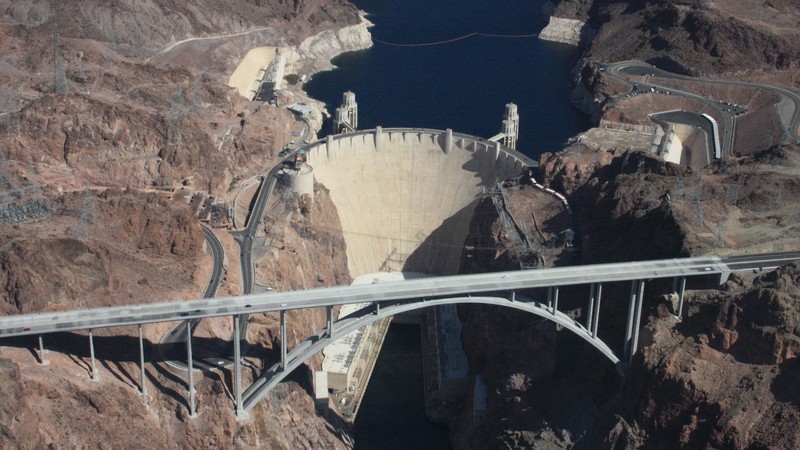Cuts will hit hardest in Imperial Valley, where farms rely on water from the river.

California’s 1,000 megawatts of power from the Colorado River’s Hoover Dam have been in jeopardy. Ubergirl / Wikimedia Commons C.C. Share-Alike 3.0 License
California will drastically cut the amount of water it takes from the Colorado River under an agreement struck with the federal government and announced by the Biden Administration on May 22. Of the seven states that draw water from the river, California takes the most, consuming 27 percent of the 16.5 million acre-feet of river water allocated per year.
An acre-foot is about 326,00 gallons, or the amount of water it takes to cover a football field one foot deep. In California, the largest share of water from the Colorado River goes to irrigate farmland in the Imperial Valley. The Imperial Irrigation District, founded in 1911, receives more water from the Colorado River than the cities of Los Angeles, Phoenix and Las Vegas combined.
As recently as August of 2022 the U.S. Bureau of Reclamation cut Colorado River water supplies to Arizona and Nevada while California got off unaffected. Not so this time around, as Arizona, Nevada and California all agreed to a combined 13 percent slash in water consumption from the 1,450-mile-long river.
The cuts were needed because water levels in the country’s two largest man-made reservoirs, Lake Mead and Lake Powell, fell so low in 2022—due to the ongoing drought and climate change—that the hydroelectric turbines powered by water from the two lakes were at risk of shutting down. The Hoover Dam, which operates hydroelectric turbines powered by Lake Mead water, provides California with over 1,000 megawatts of electricity, enough to power about 750,000 typical homes.
Thanks to runoff from the record snowpack generated by the past winter’s numerous storms, water levels in both reservoirs have been rising since early May. Lake Powell has been rising about one foot per day in May, while Lake Mead is going up by three inches per day on average.
Imperial Valley Will be Hit Hardest by Cuts
Nonetheless, Washington has been pressuring the Colorado River states to slash water consumption, and when they failed to reach an agreement to make cuts in 2022, the feds threatened to impose those cuts on their own and without regard to the long-standing agreements that govern which states get the most and least water.
Under the new agreement, the federal government will offer $1.2 billion in grants to water districts, cities, farms and Native tribes who agree to absorb the water cuts, which will total about 3 million acre-feet by the end of 2026, when the agreement expires.
Farmers in the Imperial Valley will be hardest hit by the new water cuts, but the Imperial Irrigation District has practice when it comes to using less water. Under a 2003 agreement, the district has been cutting its water use for two decades by transferring water to other water districts in Southern California. Where the district consumed 3.1 million acre-feet every year prior to the 2003 agreement, its use is now down to 2.6 million.
The 3 million acre-feet of new reductions under the agreement announced on May 22 are significantly less than the total cuts the Biden administration demanded in 2022. But the wet winter with its historic quantities of snowfall allowed for less severe cuts.